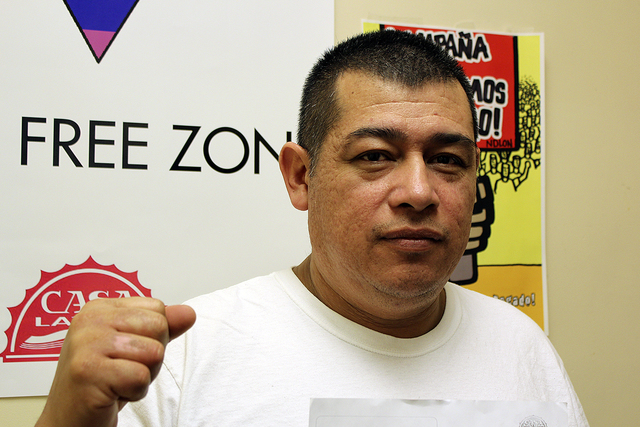A few months ago, Seattle resident and Mexican immigrant Israel Martinez was watching Univision-Seattle, a Spanish-language TV channel, when Councilmember Kshama Sawant appeared onscreen. She was discussing wage theft, and, he recalls, the importance of making sure you’re paid time and a half for any hours you work over 40 in a week. Anyone not earning that should call her office, she said—and she gave the phone number.
It was an inspiration. Martinez had been sulking at home for a solid month, he says, after being fired from his job at the Ballard location of taco-and-margarita joint El Borracho, where he’d been working in the kitchen roughly 60 hours a week for the previous two years. He often worked 12-hour shifts, but sometimes, when a co-worker didn’t show or it was a busy night, he’d work nearly double that, from 7 a.m. until the wee hours the next morning, prepping, cooking, and washing dishes.
“That was difficult for me,” he says in Spanish, through a translator. “But I would do it out of necessity and also to have a good relationship with the boss. If you’re not complying with what they asked you to do, they might decide to fire you.”
He says he asked his manager at one point if he was supposed to be receiving overtime pay; he’d been working in restaurants in Seattle for nearly a decade by then and had at least some understanding that the law existed. The response, he claims, was “It’s all calculated in there.” He didn’t want to jeopardize the job, as he supports a daughter and several younger siblings in Mexico, so he dropped the subject.
Then he was suddenly fired—on account, he was told, of untenable personal conflicts with co-workers. El Borracho owner Kittie Davidovich claims there were all kinds of problems, from running personal errands on the clock to bothering female co-workers. Martinez denies the accusations.
Soon after, Martinez saw Sawant on television. Emboldened, he called her office, and was offered three different avenues for redress: Labor &Industries, a state office; the Office of Labor Standards (OLS), Seattle’s labor-law enforcement office, established in late 2014, following the passage of the city’s minimum-wage ordinance; or Casa Latina, a dayworker and labor-rights advocacy center that has been investigating wage theft and other labor violations for 15 years. In February, he ultimately opted for Casa Latina, where program manager Cariño Barragan took on the case, operating as the interlocutor between Martinez and his former employer.
April 1 marked the first anniversary of Seattle’s minimum-wage and wage-theft ordinances; both officially took effect on April 1, 2015, and as of January 1, the minimum wage jumped to $13 an hour for employees of large companies. In December, the City Council passed a suite of extra worker protections and employer penalties, including making wage-theft victims eligible for receiving three times what is owed them.
Along with these new laws, the Office of Labor Standards last year established a $1 million Community Outreach and Education Fund that aimed to ensure that workers like Martinez would benefit from worker protections. Casa Latina received $248,000 of that, allowing the organization to develop the capacity to investigate roughly quadruple the number of wage-theft cases it took on in 2015.
It seems, therefore, that much of the effort to protect worker protections and labor rights has grown some serious teeth. Seattle workers are now, or soon will be, pretty empowered to ask for what they’re owed; even if overtime law isn’t new, having this many avenues for redress certainly is.
El Borracho’s Davidovich calls the episode with Martinez “the hardest lesson I have learned as the operator of a small business”—a lesson “straight out of the Restaurant School of Hard Knocks.” She says that when Israel Martinez had been working full time at El Borracho for a few months, he proposed dropping his second job and taking on more hours at El Borracho, and, in lieu of being paid overtime, bumping his hourly wage from $14 to $15.
She calls it a good-faith agreement, and says now it was the restaurant’s “first mistake”: “We foolishly did not realize at the time that paying overtime is mandatory regardless of whether both parties agree,” she says.
The restaurant’s second mistake, she says, is to have kept Martinez on an hourly wage although she claims he was, in fact, promoted to a salaried, overtime-exempt position. She says that he set his own hours and hired and fired kitchen staff, “clearly indicative of a management role,” but “he was resistant to switching to salary, so we did not press the issue.”
Martinez denies making the original proposal. But regardless of what actually happened here, the law is the law, and it’s been strengthened repeatedly in this city to support hourly workers—and discourage under-the-table agreements.
Davidovich consulted an attorney, and was told that it would be impossible to prove the overtime-exempt argument in court. El Borracho settled for $13,000 in back wages on March 21, which, minus taxes and deductions, meant Martinez received an $8,327.40 check—one of Casa Latina’s biggest wins to date.
Despite such a significant and swift win—Barragan says a month is a remarkably short time to settle a case—Martinez is not particularly thrilled. “I didn’t ask for free money, just to be paid for the work that I did,” he says. “So I’m not happy. I don’t trust now. I feel that everyone is stealing from me.”
Whether or not he’s being transparent about how his lack of overtime wages came to be, the law, he adds truthfully, obligates employers to pay overtime; “workers shouldn’t have to ask.” But if they do, Seattle’s got their back. E
sbernard@seattleweekly.com








